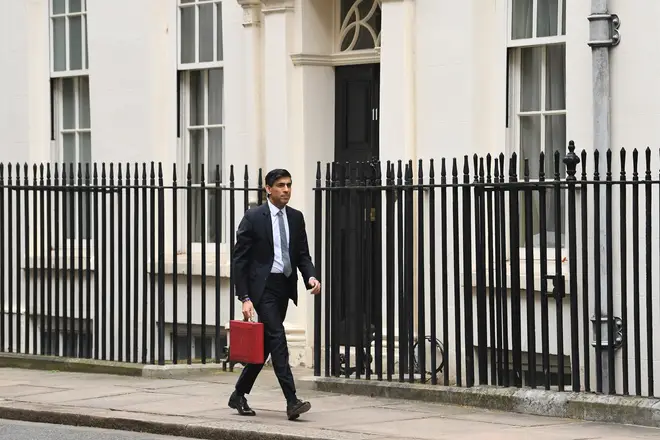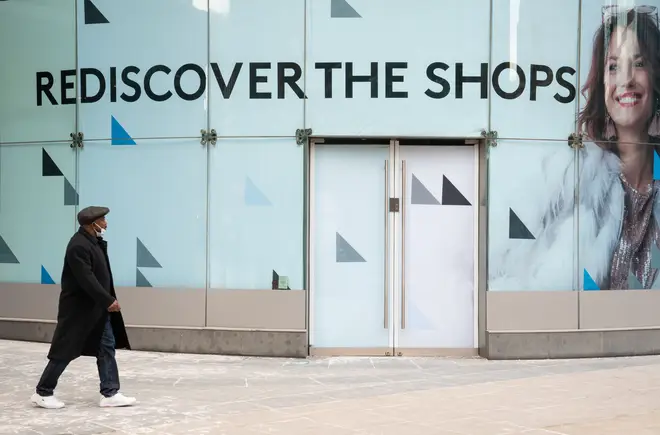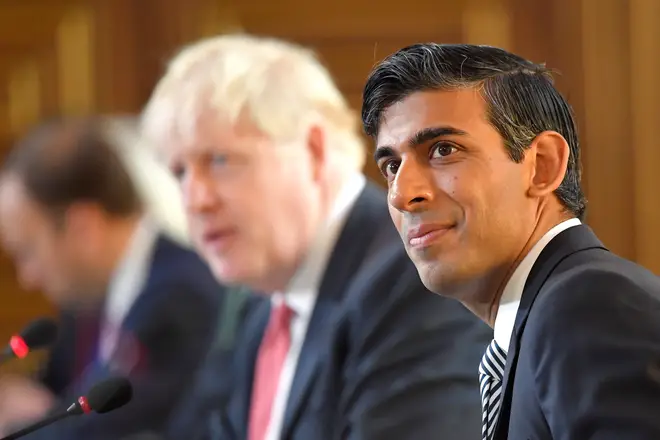
Clive Bull 1am - 4am
1 March 2021, 12:00 | Updated: 3 March 2021, 11:09

Rishi Sunak will deliver his key Spring Budget speech to Parliament on Wednesday, as the UK faces its most significant economic challenge in decades. So what should we expect from the budget?
The chancellor will look to outline the continuing support from the Treasury during the pandemic, while also stressing the need for long term savings to keep the growing public debt in check.
The stamp duty holiday, business rates relief, furlough scheme and tax rises are all expected to feature in the Budget.
On Saturday, Mr Sunak warned the British public finances will face “enormous strains” in the coming months and years, stressing the importance of “levelling with people” about the challenges and the plans for addressing them.
At 5.1 percent, unemployment is also at the highest level since early 2016, despite the furlough scheme reducing the impact of repeated lockdowns.
What should we expect in the Budget? Which taxes will rise? Will the stamp duty holiday be extended? And will furlough continue?
Read more: Stamp Duty holiday could be extended until the end of June 2021
Read more: When is Budget Day 2021 and what time is Rishi Sunak’s announcement?

Sunak must increase support for worse off in budget, Andy Burnham says
Chancellor Rishi Sunak is expected to balance two competing challenges in the Spring Budget.
He will look to set out how he plans to raise tax revenue and potentially reduce government spending to cut the deficit in the medium to long term.
However, in the immediate future, spending is set to continue at high levels to support businesses and individuals during the pandemic.
As part of this, ‘restart’ grants of up to £18,000 for businesses hit hardest by the pandemic have already been announced.
Hundreds of thousands of firms are expected to be eligible for the £5 billion scheme that aims to help them reopen as lockdown is eased.
Explained: What are the four tests for the roadmap out of lockdown?
The UK’s coronavirus vaccine rollout will also receive a boost, with £1.65 billion allocated in the Budget to help meet the target of offering a dose to every adult by 31 July.
With youth unemployment particularly high, the chancellor is also set to announce a £126 million boost for traineeships.

It has been confirmed the furlough scheme will be extended until the end of September, with employers being asked to contribute to salaries from July.
The current schemes had been set to end on April 31, after they were extended for a third time in December.
At the weekend Rishi Sunak hinted this could be extended again, telling Sky News he would “do whatever it took” to support people through the lockdown roadmap, which runs until 21 June at the earliest.
The Chancellor also set to announce that more than 600,000 people, including the newly self-employed in 2019-20, will now be eligible for government support.
The £20 per week uplift to Universal Credit, introduced during the pandemic, is also set to be extended for a further six months.

The Commons Work and Pensions Committee has called on the top-up to continue until April 2022 as a “bare minimum”, arguing to end it would drag many “down into destitution”.
It is currently set to finish on 31 March, however in February ministers said it was “unhelpful scaremongering” to suggest this would end, adding discussions were “ongoing” over extending the increase.
Read more: Rail fare rises 2021: Ticket prices hiked by 2.6% despite low demand

'Morally wrong' of Govt to create uncertainty around Universal Credit
It has been widely reported that Rishi Sunak will extend the stamp duty holiday on property sales up to £500,000.
It is currently set to end on 31 March, but is likely to continue until the end of June, as the chancellor aims to keep the property market buoyant as lockdown ends.
However, Labour have argued the scheme should be scrapped, branding it “another tax giveaway to second homeowners” and arguing the chancellor should prioritise protecting family finances.
A mortgage guarantee scheme is also set to be part of the announcements in the Budget, aiming to help first time buyers move onto the property ladder.
The scheme, first announced by Boris Johnson at the Conservative Party conference last year, will offer 95 percent mortgages on properties worth up to £600,000.

Salon owner will go out of business if he doesn’t get more support
Many are calling for business rates relief to be extended, or even made permanent, to support UK high streets.
The current measures are set to expire on 31st March, although the Treasury has hinted that they may be extended in the Budget.
The chancellor is coming under particular pressure from his own backbenchers. On Monday, 45 Tory MPs from the Northern Research Group urged him to permanently reduce the tax from 50 percent of market rent to 35 percent.
They argue this is needed to “save high streets across the country”, as they face increasing competition from online vendors who do not have to pay the rates.

Sunak must steer clear of 'knee-jerk' tax hikes
The chancellor is expected to focus Wednesday’s announcement largely on spending plans, with a further announcement on tax increases expected around March 23 - reportedly nicknamed “tax day” in Whitehall.
However, we could still see an announcement on an increase in corporation tax in the Budget.
There are suggestions Mr Sunak is considering raising this from 19 percent to 25 percent across this Parliament, reversing some of the decreases brought in by David Cameron’s Conservative government.
Mel Stride, the chair of Parliament's Treasury Select Committee, told LBC’s Nick Ferrari this was a “possibility”, adding he would support a "modest increase" in the tax.

Treasury Select Chair tells LBC tax rises are 'tough choices...'
This is likely to face significant opposition, with Labour and business leaders already calling on the chancellor to hold off on any tax rises.
Speaking exclusively to LBC’s Swarbrick on Sunday, Director General of the Confederation of British Industry Tony Danker said Rishi Sunak must “stimulate the recovery rather than stifle it”.
Shadow Chancellor Anneliese Dodds added that raising taxes is "not a sensible way forward", arguing it is "the wrong approach in the middle of an economic crisis".

CBI head: Tax hikes could hamper UK's Covid recovery
There are also reports that there could be “stealth” increases in income tax and a rise in national insurance contributions for the self employed.
The Treasury have not denied that the chancellor may freeze income tax thresholds for at least three years, raising around £6 billion.
While this would not break a manifesto pledge to not raise the “rate” of income tax, it is estimated it would push 1.6 million people into a higher tax bracket by May 2024.